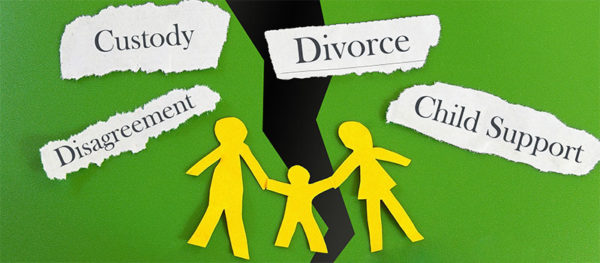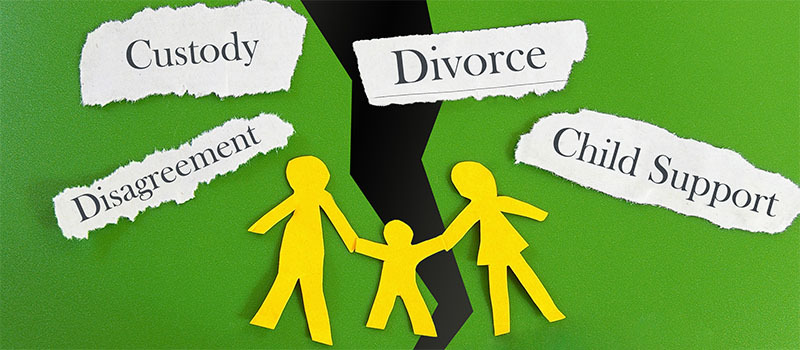
Divorce Involving Children in Arizona
Divorce Involving Children in Arizona
The decision to divorce can be difficult for any couple in Arizona. When a divorcing couple shares children, the process can be even harder on everyone involved. Divorces involving children will involve all of the other legal issues of other types of divorces, including property division and the potential for spousal support.
However, when children are involved, the couple will need to contend with child custody, child support, and the potential for parental relocation. Working with an experienced family law attorney at the Schill Law Group might help you to resolve your legal disputes when you are going through a divorce with children in Arizona.
How is the Divorce Process Started?
To begin the divorce process in Arizona, the spouse who wants to get divorced will need to file several legal documents. The initial document that must be filed in a non-covenant dissolution involving children is the petition for dissolution. Together with the petition, most people also file the preliminary injunction, which is a document that will result in an order that prevents either party from selling, transferring, or giving away the marital property until the property division has been determined.
Some women choose to file a request to restore their maiden names. An order and notice form for both parents to attend the required parenting classes should be filed. Finally, a summons must be filed. The filing fee will need to be paid at the time the petition is filed. Once the documents are filed, the court will issue the summons. The summons and copies of the petition and other legal documents will then need to be served on the respondent spouse.
Once the petition and other documents have been served on the other spouse, both parents will be required to complete the parenting classes within 45 days. The parties will also need to submit a parenting plan to the court if they have reached an agreement. If they have not, each spouse can submit a proposed parenting plan to the court to be litigated during a hearing. The court will not issue a divorce decree until the classes are completed.
Once the court has received all of the documents, the judge will make sure that the court has jurisdiction to hear the case. To meet the residency requirements, one of the spouses must have lived in the state for 90 or more days. If both spouses agree to everything, including the determination of custody and support, there will be a 60-day waiting period after the service of the petition before a final decree can be issued.

How is Child Custody and Visitations Handled While the Divorce is Pending?
A court can issue temporary orders when a petition for dissolution is filed. These orders can be used to determine which spouse will remain in the marital home during the pendency of the divorce, whether one spouse will be ordered to pay spousal maintenance to the other spouse, who will be responsible for paying specific bills, and where the children will live. If the parties agree, some of the temporary orders might become permanent orders.
In most divorces involving children in Arizona, the spouse who files a petition for dissolution will also file a request for temporary child custody orders. Parents file these requests to outline where the children will live and how visitation with the other parent will be handled until the final decree is issued.
The goal should be to minimize the upheaval in the lives of the children as much as possible. When the court decides what temporary orders to issue, the judge will consider what is in the child’s best interests. The temporary orders will normally outline where the children will live, the type and amount of visitation the children will have with the other parent, temporary child support, legal decision-making, and a protective order to prevent one of the parents from kidnapping the children or withholding them from the other parent.
The following factors are important to understand when thinking about temporary orders:
- Temporary orders will normally remain in effect until the divorce process is completed.
- The orders will be issued under the best interests of the child standard.
- Temporary orders can be contested.
- The parents must follow the orders or face potential criminal consequences.
- Temporary orders may become permanent if the parents agree.
It can take a couple of months before the court will hear a request for temporary custody orders. Either party can file a request for emergency temporary orders that can be heard within 24 hours. Normally, the requesting parent will need to show that the children might suffer irreparable harm without an emergency order.
In most of these types of cases, mental health issues, alcohol abuse, drug abuse, child abuse, or domestic violence is involved. Most of these types of requests are heard ex parte, which means that only the requesting party will appear. The judge will base his or her decision on the testimony and declarations made by the requesting party.
If the court grants the emergency custody order, a return hearing will be scheduled within seven days. The respondent spouse will then have a chance to gather evidence to contest the order and the allegations that the petitioner has made. Based on the evidence and testimony at the emergency order return hearing, the court might issue temporary orders, dismiss the emergency temporary order, or modify it.
What is the Standard Used for Determining Child Custody?
In Arizona, the courts follow the best interests of the child statute when they make child custody decisions. This standard involves the court’s consideration of several factors, which can be found at A.R.S. § 25-403. Under this statute, the courts consider the following factors:
- The relationship between the child and the parent in the past, present, and likely future
- The child’s relationship with the parent, siblings, and others in the home
- How well the child is adjusted to his or her school, home, and community
- The child’s wishes as long as he or she is of a suitable maturity and age
- The physical and mental health of all of the involved parties
- Whether one parent is likelier to encourage frequent and continuing contact with the child’s other parent unless domestic violence or abuse is involved
- Whether one of the parents misled the court intentionally
- Whether child abuse or domestic violence has occurred
- Whether one parent engaged in coercion or duress to secure an agreement
- Whether the parents have completed the required parenting classes
- Whether one of the parents has been convicted of falsely reporting child abuse or neglect
When the decision making and visitation are contested, the court will make written findings of each of the factors that the judge took under consideration. The court may also consider other relevant factors in addition to those on this list.

What are the Types of Custody in Arizona?
When people think about child custody, they normally think about where the child normally will live. In the legal context, however, legal child custody refers to which spouse will have decision-making authority for important decisions regarding the child’s education, health care, and religious upbringing.
The physical custody of the child involves where the child will live and how much time he or she will spend at each home. Both legal custody and physical custody can be either sole or joint.
Sole Decision-making
Sole decision-making occurs when the court grants the legal authority to make important decisions about the child’s upbringing solely to one parent. Courts generally prefer to order joint decision-making unless there is a compelling reason to do otherwise, including child abuse, domestic violence, drug abuse, or something else.
When a parent is awarded sole decision-making authority, he or she will be able to make important decisions about the child’s religious upbringing, medical care, and education without having to consult the other parent. In some situations, the court might grant sole decision-making authority to one parent over one area and sole decision-making authority over a different area to the other parent.
Joint Decision-making
Joint decision-making is generally favored by Arizona courts. When joint-decision making is ordered, both parents are expected to participate in making decisions for their children. If it is ordered in your case, you will need to consult with your ex-spouse before making unilateral decisions about the education, medical care, or religious upbringing of your shared children.
Residential Custody
Residential or physical custody of a child refers to where the child lives most of the time. When one parent has primary physical custody, the child resides with that parent most of the time. The other parent will have visitation according to the schedule that the parents or the court determine.
In cases in which abuse, domestic violence, or substance abuse problems have been an issue, one parent may have sole physical custody while the other party might only have supervised visitation.
How is Child Support Determined?
Under A.R.S. § 25-501, Arizona expects both the custodial and non-custodial parents to contribute financially to the upbringing of their children. The courts have guidelines that judges follow when issuing child support orders. The guidelines take into account the relative incomes of each parent, whether they have other children to support, the amount of time the children spend with each parent, and any extraordinary expenses a child might have, among other factors.
The factors that the courts take into account when determining the amount of support to order are listed in A.R.S. § 25-320.
Child support will normally be ordered to continue until a child reaches age 18 or graduates from high school. However, the court can order support to continue past the age of majority. For example, the court might order support payments to continue if children go to college or if they have developmental disabilities. Courts can also deviate from the guideline amount in certain situations.
Schill Law Group can Help With Complex Divorce
Getting divorced is difficult for most people. When children are involved, the divorce process can be more complicated because of the number of issues that may be involved. If you are planning to divorce and share children with your spouse, contact the Schill Law Group today to learn about your options by calling us at 480.525.8900.


